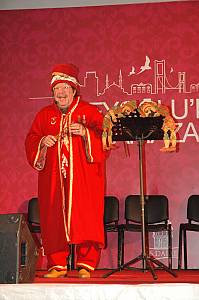Arts of the Meddah, public storytellers
Inscribed in 2008 (3.COM) on the Representative List of the Intangible Cultural Heritage of Humanity (originally proclaimed in 2003)
Meddahlik was a Turkish theatre form performed by a single storyteller called a meddah and practised throughout Turkey and Turkishspeaking countries. Through the ages, similar narrative genres have flourished due to interaction among the peoples of Asia, the Caucasus and the Middle East within this wide geographical area.
Historically, meddahs were expected to illuminate, educate, and entertain. Performing in caravanserais, markets, coffeehouses, mosques and churches, these storytellers transmitted values and ideas among a predominantly illiterate population. Their social and political criticism regularly provoked lively discussions about contemporary issues. The term meddah, borrowed from Arabic maddah “to praise”, can be translated as “storyteller”. The meddah selects songs and comic tales from a repertory of popular romances, legends and epics and adapts his material according to the specific venue and audience. However, the quality of the performance largely depends on the atmosphere created between storyteller and spectators, as well as the meddah’s ability to integrate imitations, jokes and improvisation often relating to contemporary events. This art, which places great value on the mastery of rhetoric, is highly regarded in Turkey.
Although some meddahs still perform at a number of religious and secular celebrations and appear on television shows, the genre has lost much of its original educational and social function due to the development of the mass media and in particular because of the appearance of TV sets in cafés.



